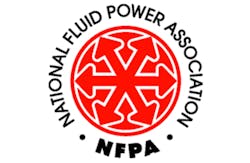The National Fluid Power Association’s Education and Technology Foundation has launched a new annual giving society to increase support for fluid power education and research.
Named after Blaise Pascal, the French mathematician, physicist and inventor whose famous law describes the fundamental principle that gives fluid power its force multiplier effect, the Pascal Society will combine the financial and volunteer contributions of companies across the supply chain to create a similar effect for the fluid power industry, according to an official announcement.
“NFPA members consistently rank the education of a well-prepared workforce as the number one challenge they face in growing their businesses and bringing new products to market,” said Eric Lanke, CEO of the National Fluid Power Association. “And so we are very excited to be launching this effort within the NFPA Foundation. The Pascal Society will provide a way to not only increase our support of fluid power education and research activities but, through a connection to the CCEFP, the Society will increase the number of productive partnerships between industry members and universities.”
RELATED: Certifiable Technical Knowhow – Making the case for a fresh perspective on fluid power certification
The CCEFP, or Center for Compact and Efficient Fluid Power, is a network of fluid power research laboratories, academic faculty, graduate and undergraduate students at seven U.S. universities. Since its inception in 2006, the CCEFP has engaged more than 6,000 university students in a variety of workforce development programs, including a series of pre-competitive fluid power research projects. Those projects, directed by industry to the topics most needed, have built new fluid power infrastructure at the CCEFP schools and have successfully engaged promising students in the study of fluid power. Forty-five percent of these students have gone on to work in the fluid power industry, NFPA says.
Professor Kim Stelson of the University of Minnesota is the director of the CCEFP. “Although we have been successful in connecting students to our own industry members, the new collaboration with the NFPA Foundation will significantly widen the pool of potential industry partners,” Stelson said. “What was a small inner circle of 15 or 20 companies can now grow towards the more than 300 companies that belong to NFPA and make donations to the NFPA Foundation. With these additions, we expect to broaden our university participation, bringing fluid power to more and more schools.”
In this inaugural year, all of the existing and former members of the CCEFP have been invited to make contributions through the new Pascal Society instead of paying membership dues to the CCEFP. Those choosing to make the switch are being invited to serve on one of the industry leadership committees that will provide oversight and guidance to the pre-competitive research program of the CCEFP and some of the NFPA Foundation’s other activities.
To date, 39 companies have pledged nearly $600,000 through the Pascal Society in advance of the public announcement that will occur for the first time at the NFPA’s Industry and Economic Outlook Conference, August 11-13, 2014, at the Westin Chicago North Shore in Wheeling, Ill.


